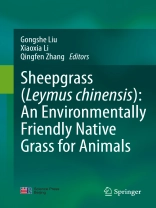This book summarizes the latest research on sheepgrass, both in China and around the globe, as well as fundamental information on the topic. Sheepgrass (Leymus chinensis (Trin.) Tzvel) is a key species in the eastern part of the Eurasian steppe and widely distributed in northern China. It is highly adaptable and holds considerable value in terms of animal husbandry and ecology / the environment. Over the past thirty years, Chinese scientists have collected and evaluated a wealth of wild sheepgrass germplasm data, and extensive basic research has been conducted on the plant’s sexual reproduction, yield, quality, and resistance. In addition, methods for utilizing new varieties in different regions have been developed. This book describes the distribution and origin, breeding, cultivation, and sexual reproduction of sheepgrass. It also discusses recent advances concerning its nutrient and water absorption and applications, grazing resistance mechanism, and gene resources mining.
İçerik tablosu
1. Basic Knowledge of Sheepgrass (Leymus chinensis).- 2. Distribution and Germplasm Phenotypic Diversity of Sheepgrass (Leymus chinensis).- 3. Varieties and Application Models of Sheepgrass (Leymus chinensis).- 4. Sexual Reproduction of Sheepgrass (Leymus chinensis).- 5. Seed Traits and Germination Characteristics of Sheepgrass (Leymus chinensis).- 6. Saline–Alkaline Resistance: Physiological and Ecological Characteristics of Sheepgrass (Leymus chinensis).- 7. Nutrient Absorption and Applications of Sheepgrass (Leymus chinensis).- 8. Absorption and Utilization of Sheepgrass (Leymus chinensis) on Water.- 9. Compensatory Growth Pattern of Sheepgrass (Leymus chinensis).- 10. Response Mechanism of Sheepgrass (Leymus chinensis) to mowing.- 11. Advances on Gene Resources Mining in Sheepgrass (Leymus chinensis).- 12. Cloning and Function Research of Sheepgrass (Leymus chinensis) Genes.
Yazar hakkında
Gongshe Liu studied agronomy at Northwest Agriculture and Forestry University in China (1978-1982). From 1982-1986, he studied at the the Universite de Clermont II and the CNRS in France, and received a Ph.D. in Plant biology and Physiology. Dr. Liu was subsequently a postdoctoral fellow at the Chinese Academy of Sciences (1986-1988). He has been working at the Institute of Botany of the Chinese Academy of Sciences since 1989, and is currently the group leader for Grass Genetic Resources and Molecular Breeding. Dr. Liu has engaged in 973 national key research projects, key national transgenic projects, NSFC projects, Chinese Academy of Sciences major and key projects, and many other commissioned projects. He is a member of the Chinese Academy of Sciences ‘Road-map up to 2050’ group of experts, is an expert for the National Grass Germplasm resources, and Chairman of the Chinese Grassland Society biotechnology committee. He has published over 80 academic papers in various journals including the Journal of Plant Biotechnology, Journal of Experimental Botany, Plant and Cell Physiology, and BMC Genomics, has filed 18 Chinese patents, and has developed three new varieties of Leymus chinensis var. Zhongke 1, 2 and 3. Dr. Liu was awarded first prize by Beijing Science and Technology, and the first prize for science and technology by the Chinese Grassland Society.
Xiaoxia Li has been working at the Institute of Botany, Chinese Academy of Sciences since 2013. Dr. Li’s research focuses on forage genetic resources and the molecular basis of resistance and seed germination of sheepgrass. Her findings have been published in e.g.Journal of Experimental Botany, Plant Biotechnology Journal, Plant and Cell Physiology, BMC Plant Biology, Physiologia Plantarum, Plant Physiology and Biochemistry, Peer Journal, Plant Molecular Biology Reporter,and Acta Prataculturae Sinica.
Qingfen Zhang is a doctoral graduate student at the Instituteof Botany, Chinese Academy of Sciences, and is an expert at the Renewable Energy Center at the National Development and Reform Commission’s Energy Research Institute, Internet Society of China, and China Quality Certification Center special expert. He has been engaged in research on technology and policy in the related fields of biological industry for over 10 years. As Head of the project and a key member of the national and provincial level projects, Qingfen Zhang has participated in research on more than 50 major strategic, planning and policy issues. He has participated in the writing of more than 10 books, and over 10 papers published in leading journals. Qingfen Zhang has also completed extensive research reports, and received the People’s Government of Beijing Science and Technology Research third prize, the National Energy Administration Soft Science Research second prize, and other provincial and ministerial level scientific and technological achievement awards.












